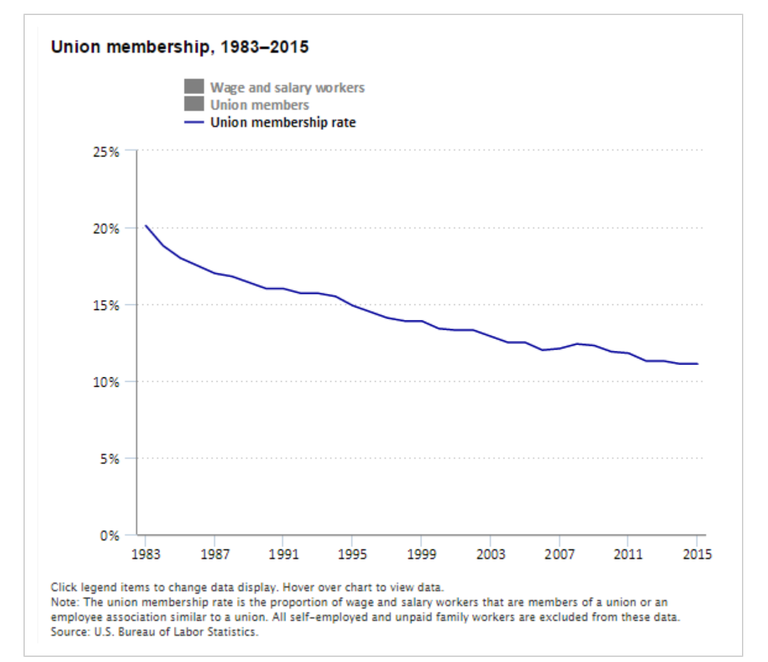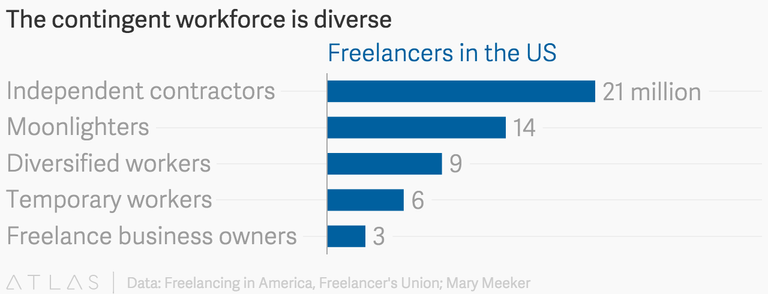Here is my introduction, I hope to find some kindred spirits here on steemit and am excited to be a part of this revolutionary community.
Me - I spend my days lately working at abstracting business processes, writing smart contracts and methods to incentivize collaboration through crypto economics.
Although I am enamored with the power of decentralization, particularly when coupled with platform/cooperative business structure - I am not going to be the guy spouting off ill-advised token trade opportunities, or the next hot ICO.
Instead, I will likely share worries about our lack of preparation for the effect of full-scale automation on employment, indications that the economic picture is not quite as rosy as portrayed by BLS stats but hopefully more than that I want to share a positive/optimistic vision of the future that I have cultivate related to the confluence of a number of exponential technologies.
This vision is rooted in a hope that by working hard with the right mission in mind I can do my part in co-creating a future that leverages these advances for the good of all of EVERYONE!
Everyone, Inc. is almost ready to launch - a cooperative membership association providing all of us with the tools we need to create safety, health and wealth in the new economy!
The labor market indications and the speed with which exponential technologies can overtake current systems are a natural interest area because I believe that the future of work, issues like income and wealth inequality, portal benefits and a safety net for everyone are among the most pressing needs we could work together to solve. Prior to moving out west, I was an attorney working for a number of ERISA Funds and Organized Labor Unions in New York.
Despite the fact I spent law school geeking out in Intellectual Property and working as a clerk for the Commodity Futures Exchange, I loved working with my New York Union clients, the experience provided me with the ability to be involved in more than just work, but really dig in as an advocate and use my skills to help real people instead of the massive corporations I worked for at my Firm jobs and summers.
That fit makes sense as I was a Labor Union kid - both of my Grandfathers had been able to provide for their families, build houses and buy cars and raise their family's in relative comfort solely on the income from their respective Union jobs. My Aunt, a huge positive influence on me in my life -was also an attorney for the Teamsters. On my last trip back home my Mom found a picture that reminded me I was a Union member as a 15 year old bag-boy at the local grocery store.
I was brought up to respect hard work and understand the concept of solidarity and the importance of working together to make good things happen. I had respect labor leaders because I had tangible evidence of their impact which provided better lives for my family. I connected more with the members I worked with than I ever did with the clients at big law firms. Sure I wasn't making nearly the salary, but I also didn't feel like I spent my day selling my soul - so it seems like a fair trade-off.
In my position as outside counsel for over 5 years I witnessed something else - I saw the erosion and slow demise of some of the last strong private industry Unions in the country. I saw workers who trained and worked hard lose jobs despite that work. I know firsthand the almost reflex of business to fire, lay off, or re-position employees to save profits.

Since moving to California I have been an entrepreneur, working in a variety of industries - founding 4 companies, raising capital, growing and scaling and even exiting ventures. This experience has been both deeply rewarding and totally isolating. As a freelance/solo/entrepreneur, all of the benefits that were packaged with the social contract around work are gone. Often it is confusing, expensive, complex to figure out how to put together individual market solutions that resemble the suite of benefits others still have at W2 jobs. I know that it is hard to manage a business and invoice, chase payments from delinquent clients, do businesses development, marketing, and the million other hats you wear on a startup founding team.
I know that freelancers, gig workers, contingent staff - we would be better off pooling the complexity and leveraging our buying power to get the products, coverage, and protection we need in the market. I know I could have used a paid sick day during the years I didn't have that opportunity, I know I would have liked to take a paid vacation once in those years, or access to affordable health plans for me and my family. I know that many of you can relate as the freelancer/contingent workforce continues to grow massively from 34% of the workforce today in the US, ballooning to 43% by the year 2020.

As more of us move to Independent contractor mode, we need networks to assist us in living a healthy life. My worry is that even at the height of this move to a less stable work mode advances in automation could destroy as many as 73 million U.S. jobs by 2030. It is widely understood that the trucking industry will be the first casualties of self-driving technology. Truck driver is the number 1 occupation in 30 states.
I have two young kids, kids I hope to bring into a world that has opportunities for them to earn a living, not face stress related to income or debt, and be happy. I worry that my parents who have diligently socked away cash in their retirements could experience an unexpected cost or a drop in the value of their retirement accounts and that I would be hard pressed to assist the way I would want to. More then anything I worry for all of us - an America divided has been a hard thing to watch these past years - but an America divided with 45% unemployment is really terrifying.
These predictions are largely being proven correct, recent automation.
Hey Tyler, nice to meet you, and excellent post btw. I look forward to reading more of your posts in the future and hoping the independent labor force of the US will be given the proper resources to sustain an independent life--insert Steem concept.
The US Census estimates that by 2025, 1 in 5 Americans will be a senior citizen. I envision this to create an even larger gap in the national workforce growth, leaving the next generation to figuring out how to generate more artificial intelligence energy for the workforce.